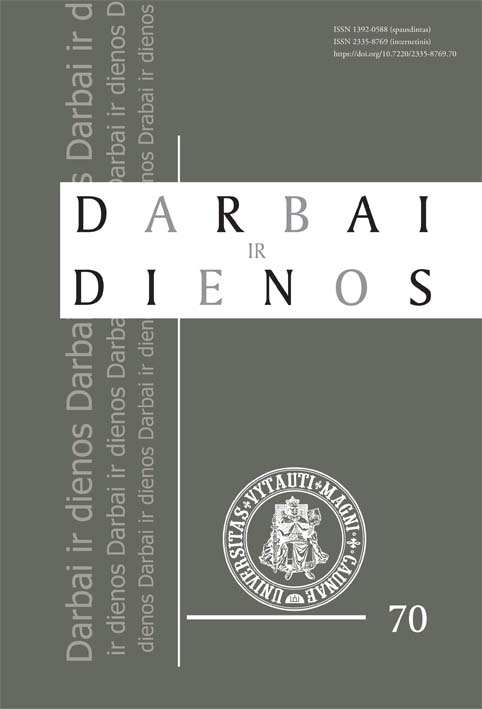Politinės mąstysenos tradicijos Simono Daukanto istoriografijoje: respublikonizmas ir verslumas
The Synthesis of Traditions of Political Thought in Simonas Daukantas’s Historiography: Republicanism and Entrepreneurship
Author(s): Saulius PivorasSubject(s): Politics / Political Sciences, History, Language and Literature Studies
Published by: Vytauto Didžiojo Universitetas
Keywords: Republicanism; Commercialism; Cultural freedom; Historiography
Summary/Abstract: Istoriografija siejasi su politinio mąstymo tradicijomis, jas išreiškia, jomis remiasi ar joms prieštarauja skirtingų šalių specifiniuose kontekstuose. Istoriografijos raidos tyrinėtoja Monika Baar savo komparatyvistiniuose darbuose jau glaustai yra parodžiusi, kad Simonas Daukantas neįprastai jungė europinę klasikinio respublikonizmo tradiciją su vadinamąja komercialistine politinio mąstymo tradicija. Pasak klasikinio respublikonizmo, turtų kaupimas susijęs su korupcija ir švaistūniškumu ir veda į moralinę degradaciją. O pasak komercializmo, privačios ekonominės sėkmės siekimas gali duoti naudos ir visuomenei. Tad šios dvi tradicijos viena kitai prieštarauja, yra konfrontacinės. Tačiau Daukantas sugeba jas suderinti. Remiantis hermeneutine istoriografine analize, gali būti plačiau analizuojamas minėtų politinio mąstymo tradicijų derinys, paraleliai nagrinėjant ir kitą tautos kaip politinės-teritorinės ir kaip kultūrinės-kalbinės bendruomenės derinį Daukanto istoriografijoje. Lietuvos istorijoje Daukantas mato didžiulę prekybos ir amatų, verslumo apskritai svarbą. Kita vertus, respublikinė santvarka ir ja besiremianti valstybinė Lietuvos galybė jam svarbi pirmiausia tuo, kad padeda išsaugoti ir apginti verslių laisvų žmonių interesus. Daukantas iškelia tautą kaip pirmiausia savo kalba išsiskiriančią bendruomenę, tačiau jam lygiai svarbi yra ir teritoriškai apibrėžta, etniškai nebūtinai vienalytė tėvynė bei jos politinė laisvė. Historiography is interlinked with the traditions of political thought, expresses them, relies upon them, or contradicts them in various local contexts. Monika Baar, a researcher in a comparative perspective of historical writings in East Central Europe, has already provided a concise analysis showing how Simonas Daukantas unusually combined classical republican thinking with the commercial tradition of political thought. According to classic republicanism, accumulation of wealth is tied up with luxury and corruption and means moral degradation. Adherents of the commercial tradition believed that the pursuit of private economic success could also be of public benefit. Thus these two traditions are contradictory, even confrontational, but Daukantas combines them in a convincing way and makes them mutually adjustable. Relying upon a hermeneutical method of historiographical analysis, it is possible to widen our understanding of Daukantas’s synthesis of republicanism and commercialism while analyzing, in parallel, another combination in Daukantas’s writings: that of the nation as an ethnic - linguistic community and as a political-territorial unit. Daukantas envisages the great importance of trade and crafts, and of entrepreneurship in general in the history of Lithuania. But republican polity and the power of the Lithuanian state is also important precisely in order to defend and protect the interests of free and entrepreneurial individuals. Daukantas put emphasis on the Lithuanian nation as primarily a community united by the mother tongue, but equally important for him is the fatherland with clear geographical-territorial borders, not necessarily ethnically homogeneous but possessing political freedom.
Journal: Darbai ir dienos
- Issue Year: 2018
- Issue No: 70
- Page Range: 89-111
- Page Count: 23
- Language: Lithuanian

